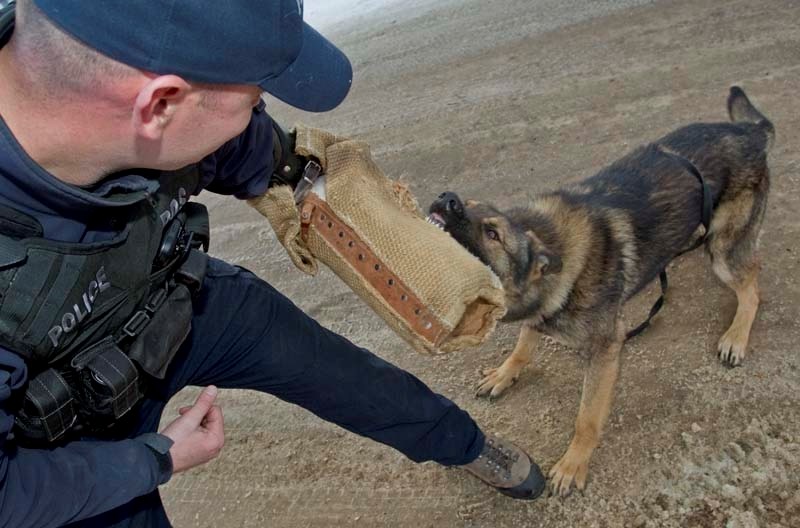There's a new member of the RCMP in town, and he's a 75-pound furball of pure energy. His name is Echo and he's one of the province's newest bomb-sniffing dogs.
There’s a new member of the RCMP in town, and he’s a 75-pound furball of pure energy.
His name is Echo and he’s one of the province’s newest bomb-sniffing dogs.
A month into the job, the 18-month-old German shepherd has already accompanied the prime minister on a visit to Inuvik, N.W.T., and found a missing elderly snowshoer in Stony Plain.
Last week he located his sixth human catch, a man who fled from police and was wanted for a residential break and enter in Morinville.
“It’s amazing what these dogs do for so little,” remarked Echo’s handler Cpl. Andy Brown. “But dogs inherently love to search. They’re having fun.”
Trained in Innisfail – like all Canadian police dogs – Echo joined the force in September.
Echo is a full-profile dog, which means he’s trained to sniff out bombs as well as to track, search and take down criminals. These types of dogs are used provincially as well as nationally, most notably for security at the G8 Summit and the Winter Olympics in 2010.
Some full-profile dogs are trained to sniff out narcotics instead of explosives.
There are 15 full-profile dogs in northern Alberta. Echo and Brown are based at the St. Albert detachment and serve the Edmonton-Jasper area.
Risk and reward
Police dog training is simply praise and reward, with constant repetition to maintain consistency, Brown said.
Echo is a happy, playful dog now, Brown noted, but with more experience in the field he will “harden” up.
The average age of retirement for a police dog is seven years old.
“We try to keep (training) fun to keep their interests high but there’s a big adjustment from training to operational,” said Brown, noting that in the field there are a lot of factors beyond an officer’s control.
When the dog is apprehending a suspect, they will get fought, punched and on the extreme end – stabbed and sometimes killed. When taking the suspect down, the dogs are initially trained to grab and hold an extremity, but once they’re established, it’s “take whatever you can get,” Brown said.
“That is ideally what we want because they’re not always going to get an arm or leg. Aggression wise, they’re aggressive as they need to be to win. If there’s a big fight from the suspect, the dog will elevate their level of intensity,” said Brown, adding the animal’s fight or flight instinct will then kick in.
“They learn over time … that this is for real and they become a more serious working dog.”
Just a month into the job, Echo and Brown work 10-hour shifts four days per week. One of them is always on call.
“He’s the first thing I see when I wake up and the last thing I see before I go to bed,” chuckled Brown.
Echo lives with Brown and his family. Their “home office” is the police cruiser, seeing as the duo are on the road so much.
“His hours are my hours; my hours are his hours.”
The detachment’s former drug dog, a golden retriever named Dodger, retired from the force last year.
Currently, there are 131 full profile German shepherd police dog teams and 24 specialty dog teams that detect narcotics or explosives in Canada.
The estimated cost of training a RCMP officer-dog team is $60,000.
“All they have to do is find one person to save – a missing kid or a missing hunter – and they’re worth every penny,” said Brown.
